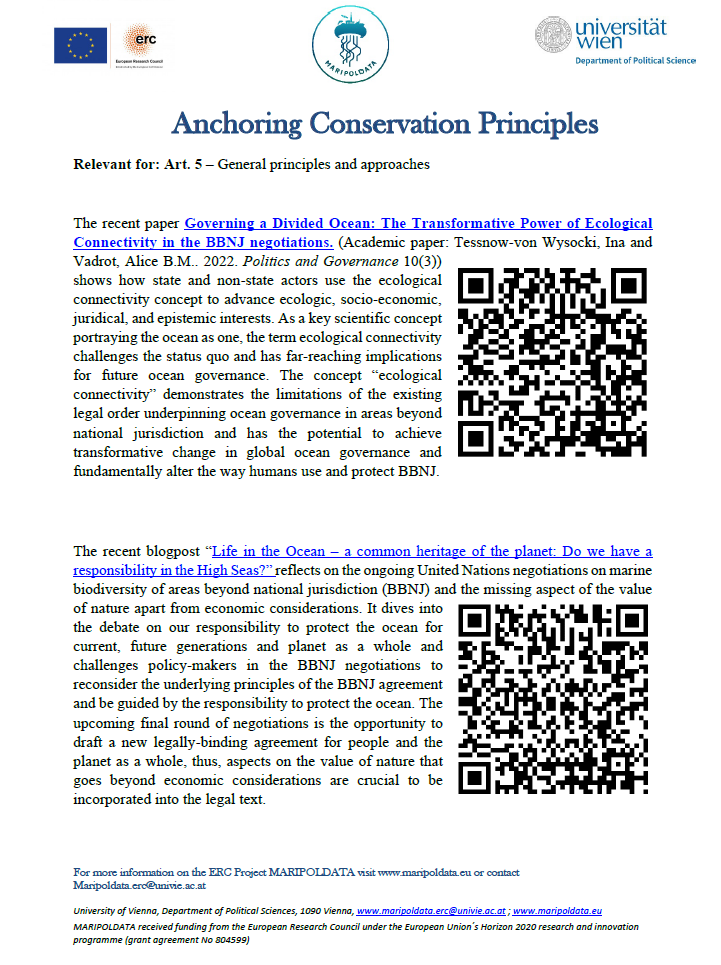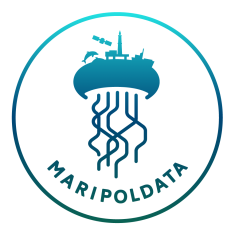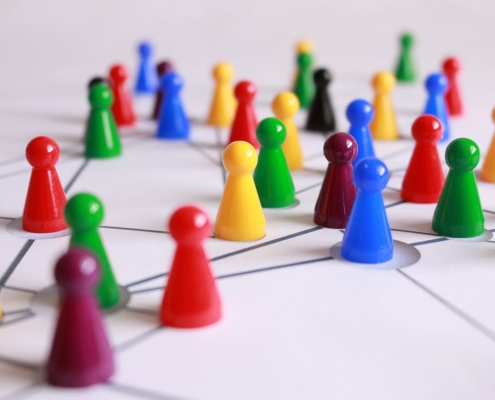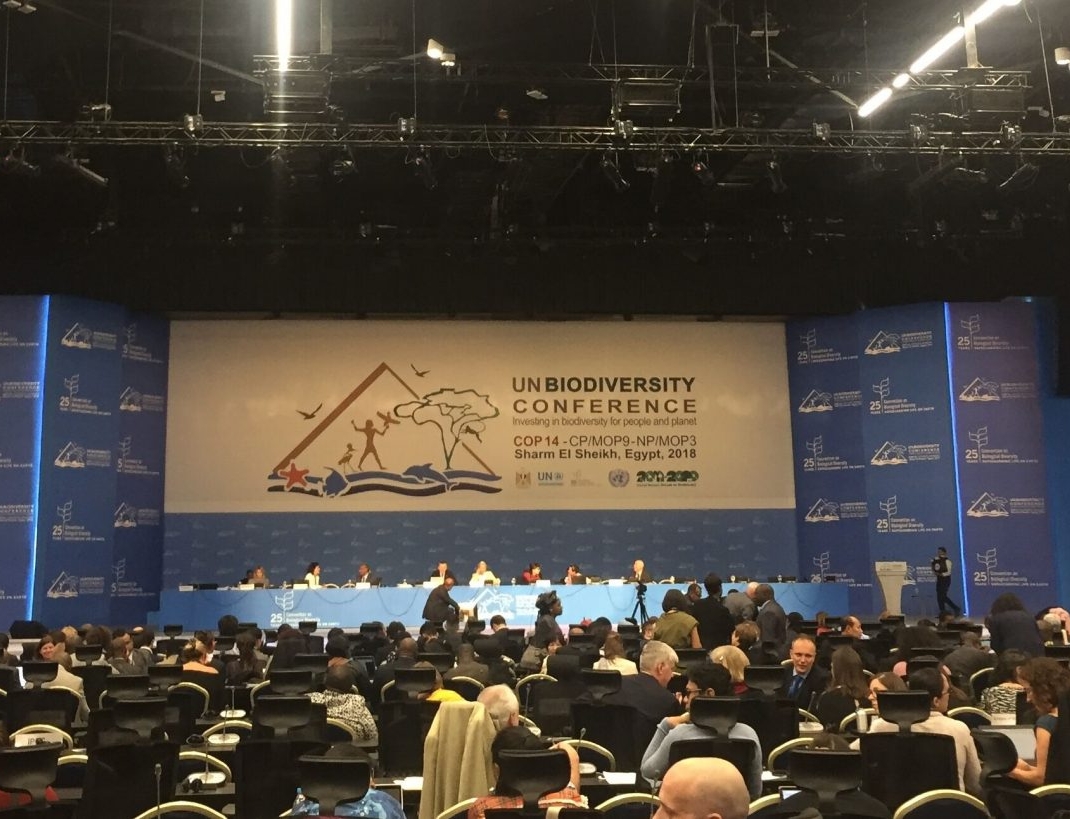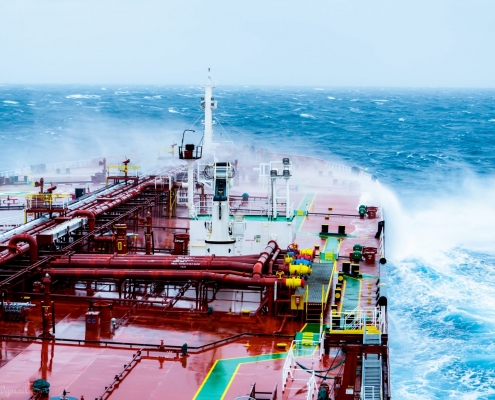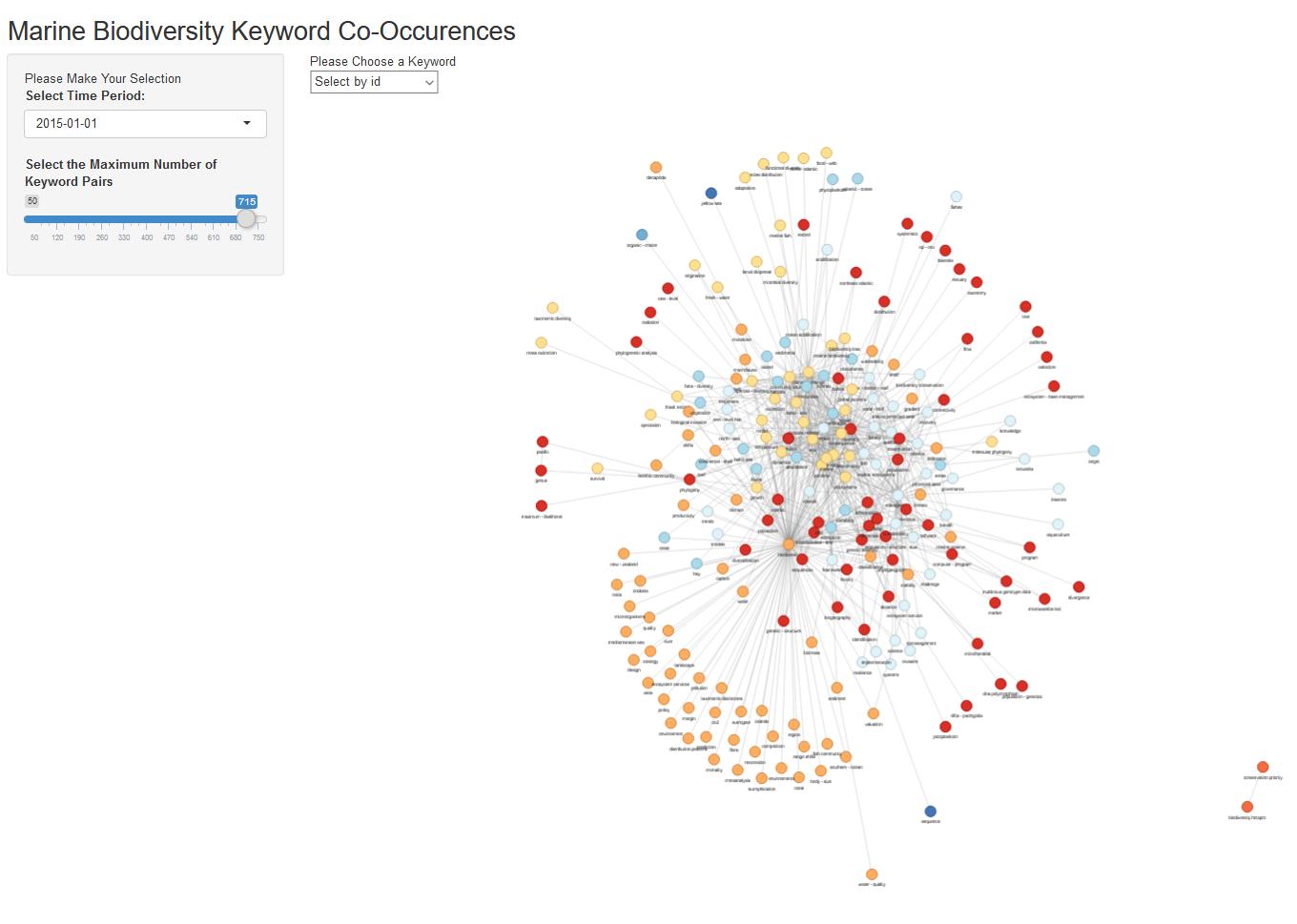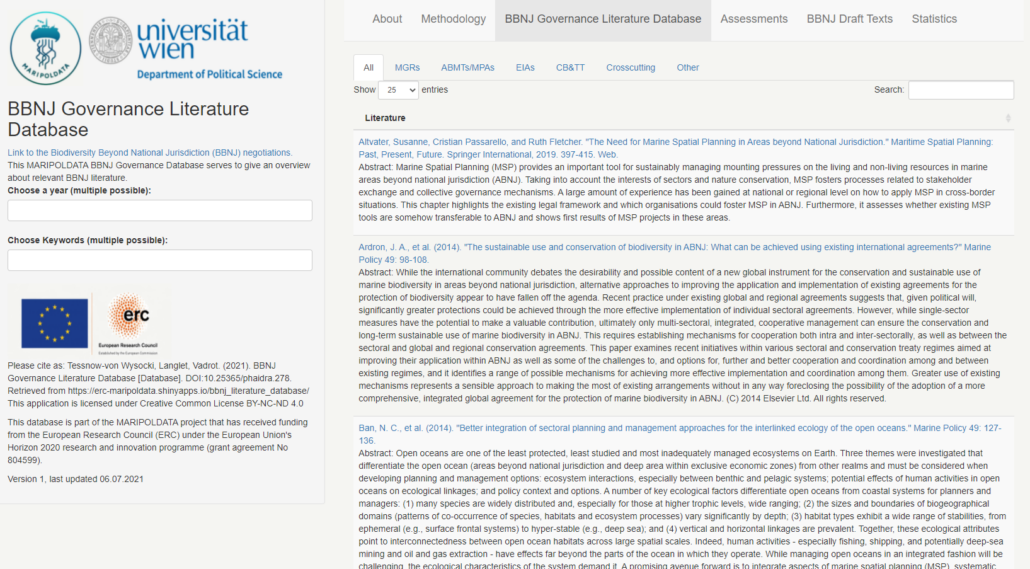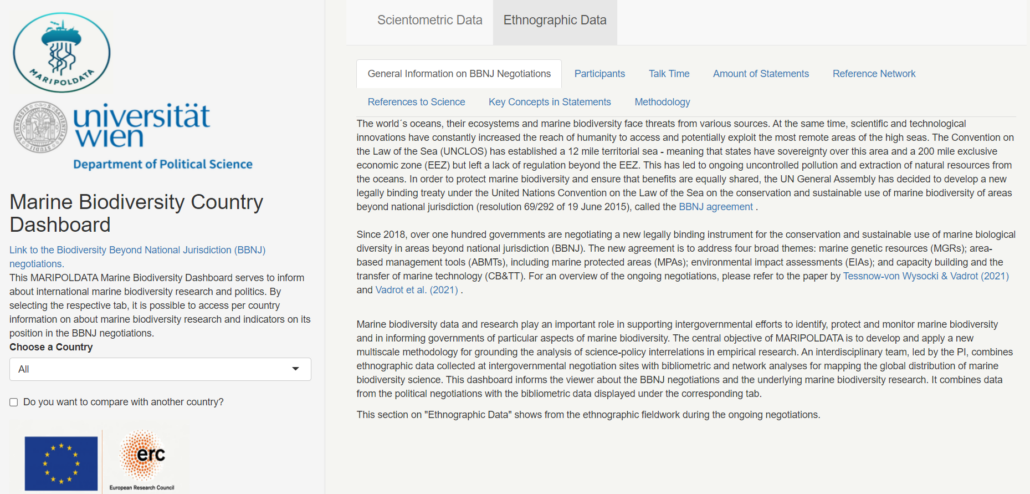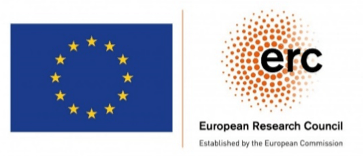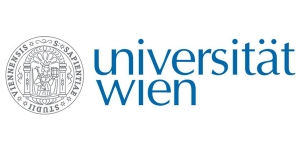Investigate the negotiations of a new legally-binding treaty under the UN Convention on the Law of the Sea aiming at the protection of marine biodiversity (WP1).
AIMS AND OBJECTIVES
MARIPOLDATA aims to overcome gaps in how marine biodiversity data and monitoring within international politics is understood, studied and practiced. The project will significantly advance our knowledge of how marine biodiversity science is represented, developed and used in international negotiation settings and national monitoring programmes.
This will allow empirically grounded conclusions on how science-policy interrelations materialise and transform the governance of the global commons. The overall objective of the project is to develop and apply a new multiscale and interdisciplinary methodological approach for grounding the analysis of science-policy interrelations in empirical research.
The application of this approach to the newly emerging field of marine biodiversity politics will transform our understanding of the role of data in governing the oceans by producing fine-grained analyses of global and national monitoring policies and practices. The MARIPOLDATA project has four specific objectives, which are linked to four interrelated work packages and a specific set of research questions:
Map and analyse the distribution of marine biodiversity science and expertise around the globe and assess the opportunities for developing and using global and national monitoring infrastructures (WP2)
Examine the role of scientific data in international negotiations and processes for identifying and protecting ecologically or biologically significant marine areas (EBSAs) in the framework of the CBD) (WP3).
Analyse and compare selected regional and national biodiversity monitoring policies and practices with regards to the political and technological strategies employed to access, regulate, manage and use marine biodiversity data. (WP4).
METHODOLOGY
The MARIPOLDATA project develops and applies a methodology that allows data collection at different field sites, policy levels and spatial scales. A set of qualitative and quantitative methods will be applied to empirically investigate how scientific concepts, criteria and indicators travel between different scales, as well as between sites of policy-making, assessment and monitoring. This will reveal the actual impacts and outputs of “big science” networks and activities on international negotiations and national monitoring infrastructures. By combining international and national scales, the research team will investigate how the positioning of governments related to science and technology within two international negotiation settings is linked to the actual policies and practices of national monitoring and data infrastructures (including investments, science policy, training programmes and big data management and analysis).
This will produce an unpresented understanding of the role of science and technology in governing and sharing benefits from marine biodiversity. The projects charts representations of marine science and data from the international level to the national levels, using moments of contestation to identify the different interests in marine biodiversity data and analyse the different expectations associated with its use. An important aspect of this is how these moments of contestation relate to the numbers, concepts and scientific criteria used at the national level – namely, the actual knowledge and data infrastructures developed and used in the pursuit of monitoring marine biodiversity.
Data will be collected and analysed across different policy-levels and spatial scales by combining 1) ethnographic studies at intergovernmental negotiation sites with 2) a comparative analysis of national biodiversity monitoring policies and practices and 3) bibliometric and social network analyses and oral history interviews for mapping marine biodiversity science.
WORK PACKAGES
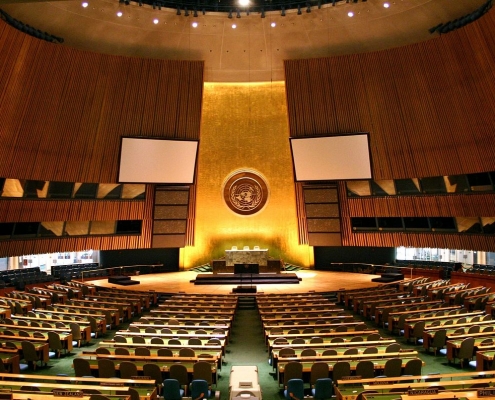
Work Package 1 investigates the negotiations on a new international legally binding instrument under the United Nation Convention on the Law of the Sea (UNCLOS) on the conservation and sustainable use of marine biological diversity of areas beyond national jurisdiction (BBNJ). The project team participates in the negotiation sessions of the Intergovernmental Conference at the UN Headquarters in New York and conduct ethnographic research. Particular attention will be placed on the role and representation of marine biodiversity science and data in the negotiations and how different governments use and contest scientific knowledge throughout the negotiating process.
Presentations & Talks
2024
Ruiz Rodriguez, Silvia. C: “Not in my waters: Struggles over coastal and marine biodiversity in the negotiations of the Kunming-Montreal Global Biodiversity Framework”, Presentation at CEEISA-ISA International Conference 2024, The Future of Artificial Intelligence and Digital Diplomacy Panel, 21.06.2024, Rijeka, CROATIA.
Vadort, Alice: “Zooming in on Agreement-Making: Tracing the Biodiversity Beyond National Jurisdiction Negotiations with the MARIPOLDATAbase”, Presentation at Global Governance Centre, Maison de la paix, Geneva, on May 7th, 2024.
2023
Ruiz Rodriguez, Silvia. C; Vadrot, A.: “Boundary work on ocean space: Competing knowledge claims in the making of marine protected areas”, Presentation at ESG Conference 2023, Knowledge System Panel, 25.10.2023, Nijmegen, NETHERLANDS.
Vadrot, A., Ruiz-Rodríguez, S. C., & Tessnow-von Wysocki, I.: “Not in my waters: Linking and unlinking marine biodiversity in the negotiations of the Kunming-Montreal Global Biodiversity Framework”, Presentation at ESG Conference 2023, Biodiversity Governance: The Road Ahead Panel, 24-26.10.2023, Nijmegen, NETHERLANDS.
Vadrot, A., Ruiz-Rodríguez, S. C., & Tessnow-von Wysocki, I.: “Not in my waters: Linking and unlinking marine biodiversity in the negotiations of the Kunming-Montreal Global Biodiversity Framework”, Presentation at EISA-PEC Conference, 09.09.2023, Potsdam, GERMANY.
Langlet, A.; Vadrot, A.: “Four Years of Marine Biodiversity Negotiations in One Data Set: New Empirics for the Study of Global Environmental Agreement-Making”, DACH-Tagung 2023, 13.09.2023, Linz, AUSTRIA.
Vadrot, Alice. “Roundtable II – EU DTO: Societal aspects, ethics, and responsability”, Presentation at the Digital Ocean Forum 2023, 20.03.2023, Brussels, BELGIUM.
Vadrot, Alice. “The contribution of the social sciences and humanities to the UN Decade by identifying an array of research avenues ”, Keynote speech at the International Ocean Data Conference – II (IODC-III), 20.03.2023, Online.
Ruiz Rodríguez, Silvia Carolina; Vadrot, Alice : “Boundary work on ocean space: Competing knowledge claims in the making of marine protected areas“, ISA Annual Convention 2023, 16 March 2023, Montreal, CANADA.
Langlet, Arne; Vadrot, Alice : “How do regime complexes emerge? Using international negotiations to study regime complexity“, ISA Annual Convention 2023, 16 March 2023, Montreal, CANADA.
Vadrot, Alice: “Maritime Powers and Ocean Protection: How Science Capacity Shapes International Negotiations Outcomes“, ISA Annual Convention 2023, 15 March 2023, Montreal, CANADA.
Ruiz Rodríguez, Silvia Carolina; Vadrot, Alice : “Epistemic bordering: Negotiating knowledge to protect the ocean“, Offene Tagung der Themengruppe Polar– u. Meerespolitik der DVPW 2023, 24 February 2023, Bonn, GERMANY.
Ruiz Rodríguez, Silvia Carolina; Tessnow von-Wysocki, Ina ; Vadrot, Alice : “Not in my waters: Linking and unlinking marine biodiversity in international environmental negotiations“, Offene Tagung der Themengruppe Polar– u. Meerespolitik der DVPW 2023, 24 February 2023, Bonn, GERMANY.
2022
Dunshirn, Paul; Zhivkoplias, Erik: “The interface between Marine Genetic Resources, Patenting and Equity”, World Maritime University After Lunch Seminar, 5 December 2022, online.
Vadrot, Alice: “Contesting climate change in BBNJ negotiation: Practices of linking and unlinking marine biodiversity and climate change politics”, ESG Conference, 21 October 2022, online.
Langlet, Arne; Vadrot, Alice: “Who to listen to? – Understanding Authority in the emerging Marine Biodiversity Regime Complex”, ESG Conference, 21 October 2022, online.
Vadrot, Alice; Ruiz Rodríguez, Silvia: “Digital multilateralism in practice: Extending critical policy ethnography to digital negotiation sites”, ESG Conference, 20 October 2022, online.
Tessnow-von Wysocki, Ina; Vadrot, Alice: “Creating a Body of Science we need for the Ocean we want: Role and Characteristics of a Scientific and Technical Body for the new BBNJ Agreement”, ESG Conference, 20 October 2022, online.
Vadrot, Alice: “Warum wir eine neue Umweltpolitik brauchen”, Event “UMWELT IM GESPRÄCH: Umweltpolitik in der Krise?!” by Environmental Research Network Vienna and Natural History museum Vienna, 18 October 2022, Vienna.
Ruiz Rodríguez, Silvia C.; Vadrot, Alice: “Boundary work on ocean space: Competing knowledge claims in the making of marine protected areas”, EISA PEC Conference, 31 August 2022, online.
Ruiz Rodríguez, Silvia C.; Tessnow-von Wysocki, Ina; Wanneau, Krystel; Vadrot, Alice: Panel – “Scientific and Technical Advice for Global Governance”, ECPR General Conference 2022, 24 August 2022, Innsbruck, AUSTRIA.
Tessnow-von Wysocki, Ina; Vadrot, Alice: “Creating a Body of Science we need for the Ocean we want: Role and Characteristics of a Scientific and Technical Body for the new BBNJ Agreement”, ECPR General Conference 2022, 24 August 2022, Innsbruck, AUSTRIA.
Wanneau, Krystel: “Providing more than advice: a study of UNEP’s experts scholar, nomadic and sedentary careers”, ECPR General Conference 2022, 24 August 2022, Innsbruck, AUSTRIA.
Wanneau, Krystel; Vadrot, Alice: “Entanglements from the digitalization of oceans: unpacking digital practices in marine biodiversity research”, Digital Ecologies in Practice Conference, 29 July 2022, Bonn, GERMANY & online
Vadrot, Alice: “Protecting life below water: competing orders, interests, and forms of knowledge [SDG 14]”. Taking place in the context of the lecture “Stockholm+50: Fünf Jahrzehnte globaler Umweltpolitik”, FU Berlin, 09 May 2022, GERMANY & online. Recording available here.
Vadrot, Alice: “Erhalt von Biodiversität – Eine Herausforderung für Wissenschaft und Politik”, IIASA 50th Anniversary Event, 07 April 2022, ÖAW, Vienna, AUSTRIA. Recording available here.
Vadrot, Alice: “Die Zukunft der Ozeane: die marine Biodiversität verhandeln”, NHM Lecture, Naturhistorisches Museum Wien, 05 April 2022, Vienna, AUSTRIA.
Vadrot, Alice: Participation in Panel “Beyond a terra-centric discipline: The return of the oceans in global politics”, Section SA14, ISA Annual Convention, 02 April 2022, online.
Vadrot, Alice; Langlet Arne: “Who to listen to? – Political and Expert Authority in the Marine Biodiversity Regime Complex”, Section M00 Virtual Poster Session, ISA Annual Convention, 28 March, online.
Vadrot, Alice; Tessnow-von Wysocki, Ina. “Scientific Representations of the Ocean for Protecting High Seas Marine Biodiversity” Section: MH10 – Emerging Issues, ISA Annual Convention, 28 March 2022, online.
2021
Vadrot, Alice; Tessnow-von Wysocki, Ina. “Scientific Representations of the Ocean for Protecting High Seas Marine Biodiversity” Section: S40 – The Politics of the Ocean and Polar Regions”, EISA – 14th Pan-European Conference on International Relations, 17 September 2021, online.
Vadrot, Alice; Tessnow-von Wysocki, Ina. “United Nations Negotiations for the Future of Marine Biodiversity. A Conversation among Academics and Practitioners on the BBNJ Negotiations” (Panel), 2021 Bratislava Conference on Earth System Governance, 7 September 2021, online.
Tessnow-von Wysocki, Ina; Vadrot, Alice. “Negotiating Ocean Science? Avenues for and Struggle over the Uptake of Science in Marine Biodiversity Negotiations”, 2021 Bratislava Conference on Earth System Governance, 7 September 2021, online.
Langlet, Arne; Vadrot, Alice. “Power and Authority relations in the emerging marine biodiversity regime complex”, 2021 Bratislava Conference on Earth System Governance, 7 September 2021, online.
Vadrot, Alice; Tessnow-von Wysocki, Ina. “Studying Science-Policy interfaces in Multilateral Negotiation Settings” (Panel), ECPR General Conference 2021, 2 September 2021, online.
Tessnow-von Wysocki, Ina. “The Voice of Science on Marine Biodiversity Negotiations: A systematic Literature Review”, webinar “BBNJ and the Scientific Knowledge Democratization: An Analysis on the Brazilian Literature”, Research Group Centro de Estudos em Direito do Mar (CEDMAR), USP’s Center for Studies of the Law of the Sea, University of São Paulo, 12 August 2021, online.
Tessnow-von Wysocki, Ina; Langlet, Arne. “The MARIPOLDATA Database on BBNJ Governance Literature”, webinar “BBNJ and the Scientific Knowledge Democratization: An Analysis on the Brazilian Literature”, Research Group Centro de Estudos em Direito do Mar (CEDMAR), USP’s Center for Studies of the Law of the Sea, University of São Paulo, 12 August 2021, online.
Langlet Arne; Vadrot, Alice. “Negotiating Scientific Institutions to Monitor the Ocean – the case of the Clearing-House Mechanism and the Scientific and Technical Body under the BBNJ Agreement”, 11th MARE People and the Sea Conference, 30 June 2021, online.
Tessnow-von Wysocki, Ina; Vadrot, Alice. “Pathways for Science into Marine Biodiversity Negotiations”, 11th MARE People and the Sea Conference , 29 June 2021, online.
Dunshirn, Paul. “Governance of marine genetic resources in waters beyond national jurisdiction”, IASC 2021 Knowledge Commons Virtual Conference, 11 June 2021, online.
Vadrot, Alice. “FSS diskutiert….Meeresschutz zwischen Wissenschaft und Politik“, Forum St. Stephan, 9 June 2021, online.
Vadrot, Alice. “The role of the social sciences in and for conservation”, Digital Synthesis Workshop “How to preserve biodiversity? Best practices and failed programs” organised by the BMBF Research Initiative for the Preservation of Biodiversity (FEdA), 2 June 2021, online.
Vadrot, Alice; Tessnow-von Wysocki, Ina. “Power disparities and epistemic inequalities in the politics of marine biodiversity”, ISA Annual Convention, 6 April 2021, online.
Vadrot, Alice. “Der Schutz der Weltmeere: Wissenschafttliche Fakten und politische Agenden“, Haus des Meeres, Science Day 2021, 21 January 2021, online.
Vadrot, Alice. “MARIPOLDATA presentation”, Polar and Marine Policy Group Meeting, German Political Science Association (GPSA), 14 January 2021, online.
2020
Vadrot, Alice; Tolochko, Petro. “Studying scientific cooperation patterns for protecting marine biodiversity”, Bristish Ecological Society 2020 Annual Meeting, Festival of Ecology, 15 December 2020, online.
Vadrot, Alice. “Multilateralismus, Wissenschaft und der Schutz der Ozeane: Eine politikwissenschaftliche Untersuchung”,Vortrag im Rahmen der Klassensitzung der Mathematisch-Naturwissenschaftlichen Klasse der Österreichischen Akademie der Wissenschaften, 16 October 2020, Vienna, AUSTRIA.
Vadrot, Alice. “Studying the role of science during/in treaty negotiations: The marine biodiversity case“, Sciences Po Center for International Studies webinar, 29 September 2020, online.
Vadrot, Alice. “MARIPOLDATA presentation”, Part I: What is co-designed,solution-oriented research in the context of the Decade?, The Ocean Decade Virtual Series: Co-designing the science we need for the Ocean Decade, 24 September 2020, online.
Vadrot, Alice; Langlet, Arne. “COVID-19 effects on marine biodiversity negotiations: A new pathway for digital diplomacy?”, ECPR Virtual General Conference, 25 August 2020, online.
Vadrot, Alice. “Does the Common Heritage Principle make any difference? The case of marine biodiversity in the digital age”, 4S Annual Meeting, 18 August 2020, online.
Vadrot, Alice. “Multilateralism as a “site” of struggle over environmental knowledge: the marine biodiversity case”, ITA – Institute Of Technology Assessment Seminar, 23 June 2020, online.
Vadrot, Alice. “MARIPOLDATA – The Politics of Marine Biodiversity Data”, Meeting of the Law of the Sea Working Party (COMAR), 5 March 2020, Brussels, BELGIUM.
Vadrot, Alice. “Science-Policy Interrelations in and for Protecting Marine Biodiversity”, Biodiversity and the cultural landscape Symposium organized by Contemporary Matters, 15 January 2020, Vienna, AUSTRIA.
2019
Vadrot, Alice; Langlet, Arne; Tessnow-von Wysocki, Ina; Tolochko; Petro. “Uncertainties in current Ocean Politics”, Fourth Annual Conceptual Workshop “Uncertainty”, 29 November 2019, Vienna, AUSTRIA.
Vadrot, Alice. “Negotiating conservation and sustainable use of marine biodiversity in the high seas: insights into science and politics”, Keynote speech at the 4th International conference for Ocean Governance for Sustainability, 26 November 2019, Piran, SLOVENIA.
Tessnow-von Wysocki, Ina. “Knowing how to govern the oceans”, Polar and Marine Policy Group Meeting, German Political Science Association (GPSA), 1 October 2019, Bielefeld, GERMANY.
Vadrot, Alice. “Science-Policy Interfaces for Protecting the Oceans: A Social Science Perspective”, Marine Regions Forum, 30 September 2019, Berlin, GERMANY.
Vadrot, Alice (with Hannah Hughes, Cardiff University). “Conducting research at global environmental negotiations”, ERC MARIPOLDATA Workshop, 10-11 September 2019, Vienna, AUSTRIA.
Vadrot, Alice (with Sarah de Rijcke, Centre for Science and Technology Studies). “Exploring Policies and Practices of Studying and Monitoring the Oceans: Innovations and Interruptions in Ocean Science”, Open Panel organization at 4s Annual Meeting, 7 September 2019, New Orleans, USA.
Vadrot, Alice. “The role of oral histories in understanding science-policy interrelations”, ERC MARIPOLDATA Workshop organized in cooperation with the Centre for Science and Policy, 25 June 2019, Cambridge, UK.
Vadrot, Alice. “The Politics of Marine Biodiversity Data: Global and National Policies and Practices of Monitoring the Oceans”, 18 June 2019, Cambridge, UK.
Vadrot, Alice. “Epistemic Selectivities in Global Environmental Politics: The case of Biodiversity”, Justice and the Global Environment Colloquium, Rutgers University, 10 April 2019, New Jersey, USA.
Vadrot, Alice. “The Role of National Focal Points in Intergovernmental Organisations”, ISA Annual Convention, 29 March 2019, Toronto, CANADA.
Vadrot, Alice. “Presentation of MARIPOLDATA”, Science Talk 2019, Vienna University, 12 March 2019, Vienna, AUSTRIA.
INTERACTIVE DASHBOARD: SHOWING THE EVOLUTION OF THE MARINE BIODIVERSITY FIELD SINCE 1990
This interactive entry allows you to dive into the scientific field of marine biodiversity. We show how the field of marine biodiversity has been evolving in the past 30 years in terms of content. Marine biodiversity can be defined as “an aggregation of highly interconnected ecosystem components or features, encompassing all levels of biological organization from genes, species, populations to ecosystems […]” (Cochrane et al. 2017).The interactive dashboard allows to dive deeper into this aggregation and the different aspects covered by the concept. The dashboard is designed to show what has been written about marine biodiversity, more specifically what keywords authors use, when writing scientific publications in the field, and how the keywords are related to each other. Since the field of marine biodiversity is a rather diverse in and of itself, this visualization allows to trace the patterns of keywords and the scope of the discipline, which was continuously increasing in the last 30 years.
This visualization is based on 26.000 scientific abstracts from 1990 until 2019 (retrieved from Web of Science), and you can choose any year within this time period to see whether the keywords, or their patterns of co-occurrence have changed over time. The keywords are connected if they appear, or “co-occur” in the same abstract. By default, the visualization shows the top (highest frequency) 100 keyword pairs from the selected year, but you can select to show top 50 to top 750 pairs.
The interactive dashboard will evolve over time with more functionality and more interesting data added. We will keep you posted.
An article has been published on the MARIPOLDATA blog about this dashboard: https://www.maripoldata.eu/maripoldata-interactive-dashboard-showing-the-evolution-of-the-marine-biodiversity-field-since-1990/
(Note: the colors are mainly for aesthetic reasons and should not be over interpreted.)
MARIPOLDATA DATABASE ON BBNJ GOVERNANCE LITERATURE
This MARIPOLDATA Literature Database covers scientific publications on the ongoing intergovernmental negotiations for the conservation and sustainable use of marine biodiversity of areas beyond national jurisdiction (BBNJ). It compiles scientific, peer-reviewed literature on the BBNJ process in English language from the beginnings of BBNJ (in 2004) until now. The database is continuously updated by the MARIPOLDATA team.
Users of the database can easily navigate through a large amount of publications by filtering for specific package elements of the agreement, keywords and years of publications. Abstracts to all publications (where available) are provided to give a brief overview, as well as immediate access through a link that leads to the official publication website. Statistics are provided to show distributions of publications by topic, year, region and source. This database provides a structured, facilitated access to existing scientific publications and therefore serves to inform BBNJ decision-makers, practitioners and incentivizes further academic debates within the BBNJ scientific community throughout the intersessional period and beyond.
To get to the literature database click here:
Find more information in this blog post.
If you have any questions regarding the MARIPOLDATA project, please contact Principle Investigator Assoc. Prof. Dr. Alice Vadrot. For information regarding the methodology or if you are an author of a publication that concerns BBNJ but is not yet in the database, please get in contact with Ina Tessnow-von Wysocki . For any technical problems with the database, please contact Arne Langlet .
MARIPOLDATA MARINE BIODIVERSITY COUNTRY DASHBOARD
This MARIPOLDATA Marine Biodiversity Country Dashboard presents the ethnographic and bibliometric data collected by the project at and on the ongoing intergovernmental negotiations for the conservation and sustainable use of marine biodiversity of areas beyond national jurisdiction (BBNJ). The data is organized by country and the user can interactively select the country of interest as well as compare different countries.
This interactive dashboard serves to inform the user about a variety of indicators from the ongoing process of international negotiations as well as from the bibliometric sample of marine biodiversity-related scientific publications. The dashboard maps the behavior of governmental delegations in the BBNJ negotiations and the global distribution of marine biodiversity science by giving data on the scientific output and cooperation of a country as well as data from the ongoing negotiations such as talking time and the mentioning of core concepts.
By making this data publicly accessible, we hope to both inform the ongoing BBNJ negotiations throughout the intersessional period and making the BBNJ negotiations more transparent to the public.
To get to the country dashboard click here:
Find more information in this blog post.
If you have any questions regarding the MARIPOLDATA project, please contact Principle Investigator Assoc. Prof. Dr. Alice Vadrot. For information regarding the data displayed or technical issues, please contact Arne Langlet .
SURVEY `THE BBNJ DURING THE COVID-19 CRISIS´
Second round of the survey (November 2021-January 2022)
Since the first round of the survey in May 2020, a number of online formats have been put in place, in order to maintain momentum and continue the negotiations digitally: The UNDOALOS secretariat invited states to discuss proposals of draft text in a written form on Microsoft Teams and the states of Belgium, Costa Rica and Monaco convened the High Seas Treaty Dialogues together with the High Seas Alliance and other non-state actors to informally deliberate on treaty provisions in virtual meetings on Webex.
As there was a lot of interest in our first survey and because the pandemic-induced disruptions to the BBNJ negotiations continue to affect all actors, we conducted a second survey round. This round aims to assess if, and if yes how, actors have engaged in online BBNJ activities and how they perceive the challenges and opportunities for online formats in the context of BBNJ intersessional work and the adaption of the BBNJ treaty. Furthermore, we are interested in how actors perceive the suitability of digital and hybrid forums and tools 1) to (partly) replace on-site intergovernmental negotiations and 2) to strengthen the interaction between science and policy on BBNJ related issues and marine governance more broadly.
We are interested to hear how actors perceive the potential effects of the COVID-19 crisis on the BBNJ Treaty and how this situation has changed your interest and involvement in the process. This will enable us to understand in how far the current formats manage to advance discussions on the BBNJ Treaty, and how to set the preconditions to make these digital spaces an effective tool to reach a strong BBNJ Agreement.
We are now working on the analysis of the data and a publication based on it.
For more information please contact maripoldata.erc@univie.ac.at
First round of the survey (May 2020)
The rapid spread of the coronavirus (COVID-19) has led to quarantine measures worldwide and resulted in the cancellation or postponement of a significant number of global meetings. The fourth conference on an international legally binding instrument under the United Nations Convention on the Law of the Sea – on the conservation and sustainable use of marine biological diversity of areas beyond national jurisdiction (BBNJ Instrument) – was no exception. It is not yet known when it will take place. This greatly affected the international agenda and strategies set for the ocean in 2020.
One important pillar of MARIPOLDATA is to investigate the negotiations of a new legally-binding treaty under the UN Convention on the Law of the Sea, aiming to protect marine biodiversity based on collaborative event ethnography.
Since conducting field research (WP1) was impossible, the MARIPOLDATA team developed a survey in May 2020 to assess how the COVID-19 outbreak affects the various parties working on the BBNJ Treaty, and its impacts on the activities carried out towards the conclusion of an agreement. This study targeted all actors interested or actively working on the BBNJ Treaty. Any answers provided were confidential and resulted in a publication in Global Environmental Politics and a special report summing up the findings.
Publication in Global Environmental Politics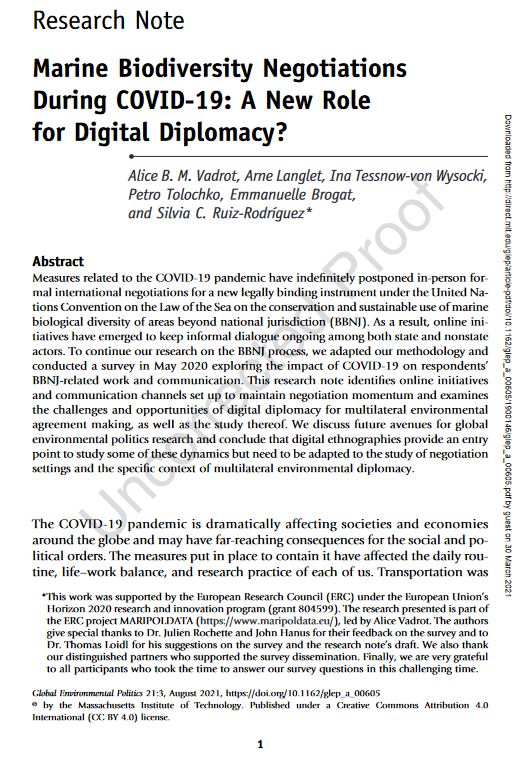
The survey results led to the research note “ Marine Biodiversity Negotiations During COVID-19: A New Role for Digital Diplomacy?” (Vadrot et al. 2021), published in Global Environmental Politics in March 2021. This publication identifies online initiatives and communication channels set up to maintain negotiation momentum. It also examines the challenges and opportunities of digital diplomacy for multilateral environmental agreement making and the study thereof. We discuss future avenues for global environmental politics research and conclude that digital ethnographies provide an entry point to study some of these dynamics but need to be adapted to the study of negotiation settings and the specific context of multilateral environmental diplomacy.
Vadrot, Alice B.M. Langlet, Arne. Tessnow-von Wysocki, Ina. Tolochko, Petro. Brogat, Emmanuelle. and Ruiz-Rodríguez, Silvia C. 2021. Marine Biodiversity Negotiations During COVID-19: A New Role for Digital Diplomacy?. Global Environmental Politics
Special Report “COVID-19 and the BBNJ negotiations“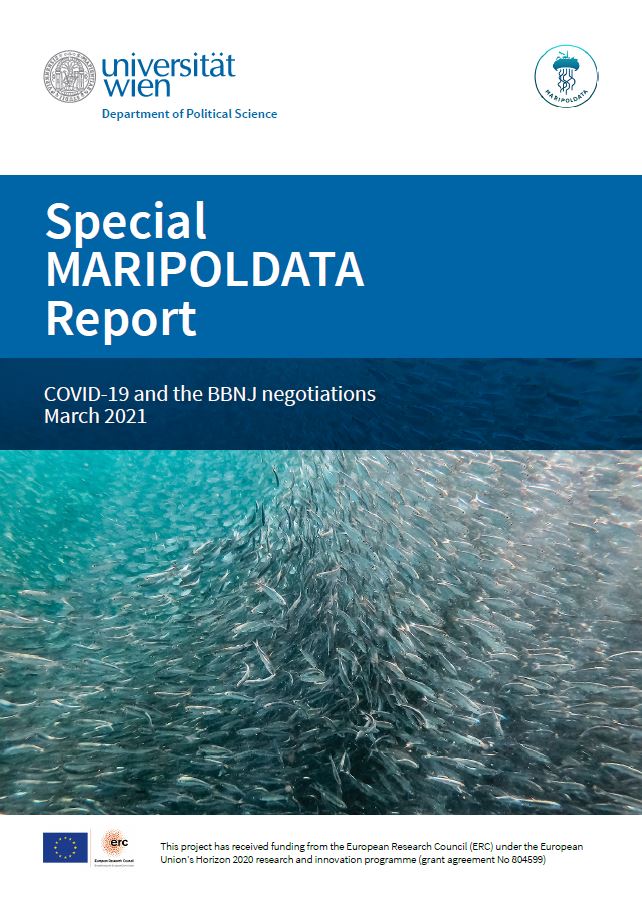
This report presents the MARIPOLDATA Corona Survey results from a geographical angle, exploring how respondents from different continents are affected by the COVID-19 situation and estimate its effect on the BBNJ process. The data was gathered via an online survey conducted shortly after the peak of the COVID-19 related lockdown in Europe, between May 04 and May 26 2020, using the formr framework for online surveys (Arslan, Walther, and Tata 2020). The objective was to obtain a representative sample of all stakeholders involved in BBNJ negotiations, such as government representatives, Intergovernmental Organisations (IGOs), Nongovernmental Organisations (NGOs), business/industry representatives, research institutes/universities, as well as UN Staff and Media. In total, 366 persons were contacted, 709 accessed the survey site, and 105 completed the questionnaire.
MARIPOLDATA IGC 5.final resources
MARIPOLDATA Resources to inform policymakers at IGC 5.final
